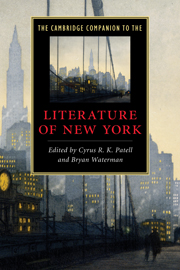Book contents
- Frontmatter
- Introduction
- 1 From British outpost to American metropolis
- 2 Dutch New York from Irving to Wharton
- 3 The city on stage
- 4 Melville, at sea in the city
- 5 Whitman’s urbanism
- 6 The early literature of New York’s moneyed class
- 7 Writing Brooklyn
- 8 New York and the novel of manners
- 9 Immigrants, politics, and the popular cultures of tolerance
- 10 Performing Greenwich Village bohemianism
- 11 African American literary movements
- 12 New York’s cultures of print
- 13 From poetry to punk in the East Village
- 14 Staging lesbian and gay New York
- 15 Emergent ethnic literatures
- Further reading
- Index
- Series list
2 - Dutch New York from Irving to Wharton
Published online by Cambridge University Press: 28 November 2010
- Frontmatter
- Introduction
- 1 From British outpost to American metropolis
- 2 Dutch New York from Irving to Wharton
- 3 The city on stage
- 4 Melville, at sea in the city
- 5 Whitman’s urbanism
- 6 The early literature of New York’s moneyed class
- 7 Writing Brooklyn
- 8 New York and the novel of manners
- 9 Immigrants, politics, and the popular cultures of tolerance
- 10 Performing Greenwich Village bohemianism
- 11 African American literary movements
- 12 New York’s cultures of print
- 13 From poetry to punk in the East Village
- 14 Staging lesbian and gay New York
- 15 Emergent ethnic literatures
- Further reading
- Index
- Series list
Summary
“DISTRESSING,”
Left his lodgings some time since, and has not since been heard of, a small elderly gentleman, dressed in an old black coat and cocked hat, by the name of knickerbocker. As there are some reasons for believing he is not entirely in his right mind, and as great anxiety is entertained about him, any information concerning him left either at the Columbian Hotel, Mulberry street, or at the office of this paper will be thankfully received.
This notice, published in the October 26, 1809 issue of the New York paper the Evening Post, was followed by subsequent announcements from the landlord of the Columbian Hotel, who threatened to sell a “very curious kind of a written book” that had been found in the aforementioned Knickerbocker's rooms, as payment for rent the missing man owed him. The ads were a hoax, the landlord fictional, but the book was quite real. It was made available for sale in New York City on December 6, 1809, with the title
A History of New-York, from the Beginning of the World to the End of the Dutch Dynasty; Containing, among Many Surprising and Curious Matters, the Unutterable Ponderings of Walter the Doubter, the Disastrous Projects of William the Testy, and the Chivalric Achievements of Peter the Headstrong - The Three Dutch Governors of New Amsterdam: Being the Only Authentic History of the Times that Ever Hath Been or Ever Will Be Published.
The narrator of this daunting tome was given as “Diedrich Knickerbocker,” he of the cocked hat and unpaid bills (see Figure 2 ). The real author is much more familiar to posterity: it was a 26-year-old Washington Irving.
- Type
- Chapter
- Information
- The Cambridge Companion to the Literature of New York , pp. 27 - 41Publisher: Cambridge University PressPrint publication year: 2010

